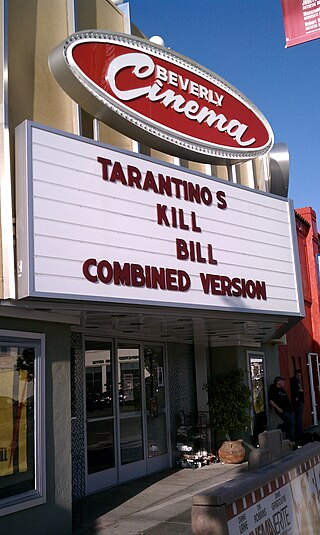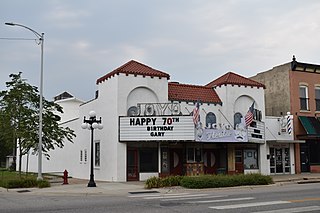
A movie theater or cinema, also known as a movie house, cinema hall, picture house, picture theater, the pictures, or simply theater, is a business that contains auditoriums for viewing films for public entertainment. Most are commercial operations catering to the general public, who attend by purchasing tickets.

Greenpoint is the northernmost neighborhood in the New York City borough of Brooklyn, in the U.S. state of New York. It is bordered on the southwest by Williamsburg at Bushwick Inlet Park and McCarren Park; on the southeast by the Brooklyn–Queens Expressway and East Williamsburg; on the north by Newtown Creek and the neighborhood of Long Island City in Queens; and on the west by the East River. The neighborhood has a large Polish immigrant and Polish-American community, containing many Polish restaurants, markets, and businesses, and it is often referred to as Little Poland.

East Williamsburg is a name for the area in the northwestern portion of Brooklyn, New York City, United States. East Williamsburg consists roughly of what was the 3rd District of the Village of Williamsburgh and what is now called the East Williamsburg In-Place Industrial Park (EWIPIP), bounded by the neighborhoods of Northside and Southside Williamsburg to the west, Greenpoint to the north, Bushwick to the south and southeast, and both Maspeth and Ridgewood in Queens to the east. Much of this area is still referred to as either Bushwick, Williamsburg, or Greenpoint with the term East Williamsburg falling out of use since the 1990s.

Williamsburg is a neighborhood in the New York City borough of Brooklyn, bordered by Greenpoint to the north; Bedford–Stuyvesant to the south; Bushwick and East Williamsburg to the east; and the East River to the west. It was an independent city until 1855, when it was annexed by Brooklyn; at that time, the spelling was changed from Williamsburgh to Williamsburg.

Bushwick is a neighborhood in the northern part of the New York City borough of Brooklyn. It is bounded by the neighborhood of Ridgewood, Queens, to the northeast; Williamsburg to the northwest; East New York and the cemeteries of Highland Park to the southeast; Brownsville to the south; and Bedford–Stuyvesant to the southwest.

The double feature is a motion picture industry phenomenon in which theatres would exhibit two films for the price of one, supplanting an earlier format in which the presentation of one feature film would be followed by various short subject reels.

RiffTrax is an American company that produces scripted humorous commentary tracks which are synced to feature films, education shorts, and television episodes. With the talents of former Mystery Science Theater 3000 (MST3K) cast members and writers, RiffTrax also produces several live shows each year which are broadcast to movie theaters. The style of commentating originated from MST3K, their earlier television series, in which they would similarly mock films aloud while watching them. As of September 2024, RiffTrax has riffed 554 feature films, 488 short films, and 16 TV episodes.

The New Beverly Cinema is a historic movie theater located in Los Angeles, California. Housed in a building that dates back to the 1920s, it is one of the oldest revival houses in the region. Since 2007, it has been owned by the filmmaker Quentin Tarantino.
The Rocky Horror Picture Show cult following is the cultural phenomenon surrounding the large fan base of enthusiastic participants of the movie The Rocky Horror Picture Show, generally credited as being the best-known cinematic "midnight movie".

The Golden Trailer Awards are an American annual award show for film trailers founded in 1999. The awards also honor the best work in all areas of film and video game marketing, including posters, television advertisements and other media, in 108 categories.
Harris Smith is an American filmmaker, media critic and essayist from New York City. He is one of the founding members of the Remodernist film movement and was a participating member of the first comprehensive Remodernist exhibition in the United States, Addressing the Shadow and Making Friends with Wild Dogs: Remodernism.

The Clinton Street Theater is a theater located in southeast Portland, Oregon, United States. It is believed to be the second oldest operating movie house in the city and one of the oldest continually operating cinemas in the United States. The theater was designed by Charles A. Duke in 1913, built in 1914, and opened as The Clinton in 1915. It became known as the 26th Avenue Theatre in 1945 and the Encore in 1969, before reverting to a resemblance of its original name in 1976. The Clinton often screens exploitation, cult and experimental films, and has become known for hosting regular screenings of The Rocky Horror Picture Show and Repo! The Genetic Opera. The venue also hosts the annual Filmed by Bike festival, the Faux Film Festival and the Portland Queer Documentary Film Festival.

Williamsburg Cinemas is a first-run multiplex theater located in Williamsburg, Brooklyn in New York City, on the corner of Grand Street and Driggs Avenue. Williamsburg Cinemas has seven theaters inside of it, is 19,000 square-feet wide, a concession stand, and has stadium-seating.

The Trylon Cinema is a 90-seat movie theater in the Longfellow neighborhood of Minneapolis, Minnesota. The cinema was founded and is currently run by Take-Up Productions, a group of volunteers who got their start at the Oak Street Cinema before establishing the Trylon in 2009 within a former warehouse. A 2017 expansion resulted in an increase in the cinema's seating capacity and accessibility. Throughout its history, the venue has featured a variety of regular programming, ranging from career retrospectives of famous directors to B movies and cult films. The Trylon has been well received by critics who have praised its film lineup, intimacy, and atmosphere.
Brooklyn Horror Film Festival is an annual film festival in Brooklyn, New York. It was founded in 2016.

Nitehawk Cinema is a dine-in independent movie theater in Brooklyn, New York City. It operates two locations, in the neighborhoods of Williamsburg and Park Slope. The theater, which offers a menu of food and drinks that can be ordered and consumed while patrons view films, was the first liquor licensed movie theater in the state of New York, and the first movie theater in New York City to offer table service.
8-Ball Community is a New York City-based artist collective that operates a zine library, online radio station, and online public-access television station.

The Joyo Theater is a historic theater in Lincoln, Nebraska. It is a single-screen movie theater adapted to also host acts on stage such as musicians and movies with a stage-show component. Constructed in 1926 as the New Lyric Theatre, the marquee and ticket booth date from the 1930s.

A shot-on-video (SOV) film, also known as a shot-on-VHS film or a camcorder film, is a film shot using camcorders and consumer-grade equipment, as opposed to film stock or high-end digital movie cameras.
















